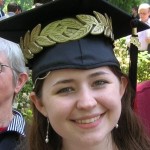We are very pleased to announce our 2014 NEH Summer Scholars.
Erika Baldt, Burlington County College
 Erika Baldt is an English lecturer at Burlington County College in New Jersey where she teaches composition and literature. She earned a Ph.D. in English and Comparative Literature from Goldsmiths, University of London with a thesis on the work of British modernists Virginia Woolf and Katherine Mansfield, and their contemporaries of the Harlem Renaissance, Jessie Fauset and Nella Larsen. She has published essays on the work of Fauset, Mansfield, Woolf, and Vita Sackville-West. Her research interests include cosmopolitanism and Anglo-American modernism, and she is currently exploring modernist adaptations of Greek mythology as responses to the First World War and its aftermath.
Erika Baldt is an English lecturer at Burlington County College in New Jersey where she teaches composition and literature. She earned a Ph.D. in English and Comparative Literature from Goldsmiths, University of London with a thesis on the work of British modernists Virginia Woolf and Katherine Mansfield, and their contemporaries of the Harlem Renaissance, Jessie Fauset and Nella Larsen. She has published essays on the work of Fauset, Mansfield, Woolf, and Vita Sackville-West. Her research interests include cosmopolitanism and Anglo-American modernism, and she is currently exploring modernist adaptations of Greek mythology as responses to the First World War and its aftermath.
Renée Calkins, University of Wisconsin, Milwaukee
 Since completing her Ph.D. at UCLA in 2010, Renée Calkins has been teaching as a full-time lecturer for the Program in Classics at the University of Wisconsin-Milwaukee (UWM). She has taught a wide array of Classics courses at UWM in the original languages as well as in translation. In addition to being active in the local chapter of the AIA, Renée is currently the coordinator for the Workshop in Ancient Mediterranean Studies, a seminar series that brings together local and visiting scholars for presentation and discussion of current research projects related to the study of the Classical Mediterranean. In her own recent research projects Renée has applied her interest in the role of commemoration in living communities to some article-length projects that integrate Greek literary works with contemporary topography and material culture. These projects include elucidation of the sculptural analogy for writing in Plato’s Phaedrus, which is set in close proximity to the cemetery at Kynosarges in Athens, and the unique visual representation of a theoria on a poorly published Thessalian votive relief dated to the fourth-century BC. Commemoration of the dead, however, was the focus of Renée’s dissertation research, and she plans a return to some of the material from her dissertation this summer on the topic of what she calls the “threat of invisible death” in the Iliad.
Since completing her Ph.D. at UCLA in 2010, Renée Calkins has been teaching as a full-time lecturer for the Program in Classics at the University of Wisconsin-Milwaukee (UWM). She has taught a wide array of Classics courses at UWM in the original languages as well as in translation. In addition to being active in the local chapter of the AIA, Renée is currently the coordinator for the Workshop in Ancient Mediterranean Studies, a seminar series that brings together local and visiting scholars for presentation and discussion of current research projects related to the study of the Classical Mediterranean. In her own recent research projects Renée has applied her interest in the role of commemoration in living communities to some article-length projects that integrate Greek literary works with contemporary topography and material culture. These projects include elucidation of the sculptural analogy for writing in Plato’s Phaedrus, which is set in close proximity to the cemetery at Kynosarges in Athens, and the unique visual representation of a theoria on a poorly published Thessalian votive relief dated to the fourth-century BC. Commemoration of the dead, however, was the focus of Renée’s dissertation research, and she plans a return to some of the material from her dissertation this summer on the topic of what she calls the “threat of invisible death” in the Iliad.
Edward Clayton, Central Michigan University
 Ted Clayton is a member of the Political Science Department at Central Michigan University, where he has been teaching full-time since 1999. His professional experience also includes five years at Trinity College in Hartford, Connecticut. His Ph.D. and MA are from the University of Michigan, and his undergraduate degree is from the College of Wooster. His area of specialty is political theory, and his current academic focus is on Aesop’s Fables as political theory, which has led to a broader interest in how the Greeks thought about animals. He hopes to use this seminar to further explore the ways in which Greek ideas about the death of animals shaped their views on human mortality. But he’s also prepared to discover entirely new interests—indeed, he’s looking forward to it.
Ted Clayton is a member of the Political Science Department at Central Michigan University, where he has been teaching full-time since 1999. His professional experience also includes five years at Trinity College in Hartford, Connecticut. His Ph.D. and MA are from the University of Michigan, and his undergraduate degree is from the College of Wooster. His area of specialty is political theory, and his current academic focus is on Aesop’s Fables as political theory, which has led to a broader interest in how the Greeks thought about animals. He hopes to use this seminar to further explore the ways in which Greek ideas about the death of animals shaped their views on human mortality. But he’s also prepared to discover entirely new interests—indeed, he’s looking forward to it.
Helen Dixon, North Carolina State University
Helen Dixon curr ently serves as Postdoctoral Teaching Scholar in the History Department at North Carolina State University in Raleigh, where she teaches ancient Near Eastern and ancient Greek civilization. After receiving her B.A. in Scriptural Interpretation from McGill University in Montreal, she completed her Ph.D. from the Department of Near Eastern Studies at the University of Michigan in 2013. Her dissertation on Phoenician mortuary practice included a catalog of all known Phoenician burials from the Levantine “homeland,” as well as a reassessment of the Greek, Latin, and Phoenician/Punic textual evidence for child sacrifice in Punic contexts. Helen’s research has taken her to archaeological sites, museums, and research centers in Israel, Palestine, Jordan, Cyprus, Lebanon, Syria, and Turkey. She is currently working toward her first book: a social history of ancient Phoenicia from the perspective of the dead.
ently serves as Postdoctoral Teaching Scholar in the History Department at North Carolina State University in Raleigh, where she teaches ancient Near Eastern and ancient Greek civilization. After receiving her B.A. in Scriptural Interpretation from McGill University in Montreal, she completed her Ph.D. from the Department of Near Eastern Studies at the University of Michigan in 2013. Her dissertation on Phoenician mortuary practice included a catalog of all known Phoenician burials from the Levantine “homeland,” as well as a reassessment of the Greek, Latin, and Phoenician/Punic textual evidence for child sacrifice in Punic contexts. Helen’s research has taken her to archaeological sites, museums, and research centers in Israel, Palestine, Jordan, Cyprus, Lebanon, Syria, and Turkey. She is currently working toward her first book: a social history of ancient Phoenicia from the perspective of the dead.
Luke Drake, University of North Carolina at Chapel Hill
 Luke Drake received a Master of Theological Studies at Harvard Divinity School (New Testament and Early Christianity) and recently completed his first year of doctoral work at the University of North Carolina at Chapel Hill (Ancient Mediterranean Religions). Research interests include early Christian apocryphal literature, ancient and contemporary interpretation of scripture, and critical theory of religion.
Luke Drake received a Master of Theological Studies at Harvard Divinity School (New Testament and Early Christianity) and recently completed his first year of doctoral work at the University of North Carolina at Chapel Hill (Ancient Mediterranean Religions). Research interests include early Christian apocryphal literature, ancient and contemporary interpretation of scripture, and critical theory of religion.
Jennifer Eyl, College of Wooster
 Jennifer Eyl has a Ph.D. in Religious Studies from Brown University (2012), as well as a B.A. and M.A. in Classics. She has taught at Barnard College, Rutgers University, and is currently a Visiting Assistant Professor at the College of Wooster. She works on ancient Christianity and ancient Mediterranean religions. Her dissertation work (currently being revised for book publication) examines the apostle Paul’s divinatory practices, and contextualizes him in the wider world of itinerant divinatory specialists of the early Roman Empire. Her other areas of interest include gender in antiquity, theory of religion, translation theory, and beliefs about life after death. She has presented several papers at conferences in the US, Lisbon, and Rome, and has published articles on the Acts of Paul and Thekla, and translation theory in New Testament studies. In September 2014 she will begin a new, permanent position at Tufts University.
Jennifer Eyl has a Ph.D. in Religious Studies from Brown University (2012), as well as a B.A. and M.A. in Classics. She has taught at Barnard College, Rutgers University, and is currently a Visiting Assistant Professor at the College of Wooster. She works on ancient Christianity and ancient Mediterranean religions. Her dissertation work (currently being revised for book publication) examines the apostle Paul’s divinatory practices, and contextualizes him in the wider world of itinerant divinatory specialists of the early Roman Empire. Her other areas of interest include gender in antiquity, theory of religion, translation theory, and beliefs about life after death. She has presented several papers at conferences in the US, Lisbon, and Rome, and has published articles on the Acts of Paul and Thekla, and translation theory in New Testament studies. In September 2014 she will begin a new, permanent position at Tufts University.
Jennifer Glancy, Le Moyne College
 Jennifer A. Glancy, McDevitt Core Professor and Professor of Religious Studies at Le Moyne College in Syracuse NY, is the author of Slavery in Early Christianity (Oxford University Press, 2002; Fortress Press, 2006 [paperback]), Corporal Knowledge: Early Christian Bodies (Oxford University Press, 2010), and Slavery as Moral Problem: In the Early Church and Today (Fortress Press, 2011). She has served as Catholic Biblical Association Visiting Professor at L’Ecole Biblique (Jerusalem) and as Camp Chair in Bible at the University of Richmond. After completing undergraduate studies in Philosophy and English Literature at Swarthmore College, Glancy earned her Ph.D. in Religion from Columbia University. Her research interests include the cultural history of early Christianity, corporeality and Christian anthropology, and comparative studies of slavery.
Jennifer A. Glancy, McDevitt Core Professor and Professor of Religious Studies at Le Moyne College in Syracuse NY, is the author of Slavery in Early Christianity (Oxford University Press, 2002; Fortress Press, 2006 [paperback]), Corporal Knowledge: Early Christian Bodies (Oxford University Press, 2010), and Slavery as Moral Problem: In the Early Church and Today (Fortress Press, 2011). She has served as Catholic Biblical Association Visiting Professor at L’Ecole Biblique (Jerusalem) and as Camp Chair in Bible at the University of Richmond. After completing undergraduate studies in Philosophy and English Literature at Swarthmore College, Glancy earned her Ph.D. in Religion from Columbia University. Her research interests include the cultural history of early Christianity, corporeality and Christian anthropology, and comparative studies of slavery.
Richard Heitman, Carthage College
 Richard Heitman, a graduate of the Committee on Social Thought at the University of Chicago, is now an associate professor of philosophy and classics at Carthage College in Kenosha, Wisconsin. He has written and lectured on Homer, Aeschylus, Thucydides, and Aristotle, and has conducted college seminars on these. He has a special knowledge of drama and dramatic structure. That interest draws on fifteen years of training as a playwright. Three of his plays were produced in New York City. Most recently he has turned his attention to a philosophical exploration of the understanding of death. He conducts a very popular seminar on the subject at Carthage. In connection to this, he is very interested in the philosophy of Hans Jonas. Richard is the author of Taking Her Seriously: Penelope and the Plot of Homer’s Odyssey (University of Michigan 2005).
Richard Heitman, a graduate of the Committee on Social Thought at the University of Chicago, is now an associate professor of philosophy and classics at Carthage College in Kenosha, Wisconsin. He has written and lectured on Homer, Aeschylus, Thucydides, and Aristotle, and has conducted college seminars on these. He has a special knowledge of drama and dramatic structure. That interest draws on fifteen years of training as a playwright. Three of his plays were produced in New York City. Most recently he has turned his attention to a philosophical exploration of the understanding of death. He conducts a very popular seminar on the subject at Carthage. In connection to this, he is very interested in the philosophy of Hans Jonas. Richard is the author of Taking Her Seriously: Penelope and the Plot of Homer’s Odyssey (University of Michigan 2005).
Gretchen Henderson, Kenyon College
 Gretchen E. Henderson is a writer who works at the intersection of literature, creative writing, book history, art history, museum studies, disability studies, and music. She is an Affiliated Scholar at Kenyon College and has taught at a variety of universities, recently completing a MetaLAB Research Fellowship at Harvard and Mellon Postdoctoral Fellowship at MIT, where she will return this fall as a Visiting Artist. Her interest in this NEH Institute stems from a book-in-progress charting a cultural history of ugliness, as well as a libretto for an opera based on the ancient seer, Cassandra in the Temples (being composed by Elena Ruehr at MIT for the New York vocal ensemble, Roomful of Teeth). Gretchen has published two novels, The House Enters the Street (Starcherone Books 2012) and Galerie de Difformité (Lake Forest College Press 2011), along with a “minor work” of criticism derived from Aristotle’s On Marvellous Things Heard (Green Lantern Press 2011) and a poetry chapbook inspired by cartographic history, Wreckage: By Land & By Sea (Dancing Girl Press 2011). Her critical and creative writings have appeared in a range of journals and anthologies, including The Kenyon Review, The Iowa Review, The Southern Review, The &NOW Awards: The Best Innovative Writing, The Journal of Artists’ Books, and Ugliness: The Non-Beautiful in Art and Theory (I.B. Tauris 2014). She received degrees from Princeton University (B.A.), Columbia University (M.F.A.), University of Missouri-Columbia (Ph.D.), and also graduated from the preparatory division of the San Francisco Conservatory of Music.
Gretchen E. Henderson is a writer who works at the intersection of literature, creative writing, book history, art history, museum studies, disability studies, and music. She is an Affiliated Scholar at Kenyon College and has taught at a variety of universities, recently completing a MetaLAB Research Fellowship at Harvard and Mellon Postdoctoral Fellowship at MIT, where she will return this fall as a Visiting Artist. Her interest in this NEH Institute stems from a book-in-progress charting a cultural history of ugliness, as well as a libretto for an opera based on the ancient seer, Cassandra in the Temples (being composed by Elena Ruehr at MIT for the New York vocal ensemble, Roomful of Teeth). Gretchen has published two novels, The House Enters the Street (Starcherone Books 2012) and Galerie de Difformité (Lake Forest College Press 2011), along with a “minor work” of criticism derived from Aristotle’s On Marvellous Things Heard (Green Lantern Press 2011) and a poetry chapbook inspired by cartographic history, Wreckage: By Land & By Sea (Dancing Girl Press 2011). Her critical and creative writings have appeared in a range of journals and anthologies, including The Kenyon Review, The Iowa Review, The Southern Review, The &NOW Awards: The Best Innovative Writing, The Journal of Artists’ Books, and Ugliness: The Non-Beautiful in Art and Theory (I.B. Tauris 2014). She received degrees from Princeton University (B.A.), Columbia University (M.F.A.), University of Missouri-Columbia (Ph.D.), and also graduated from the preparatory division of the San Francisco Conservatory of Music.
Yurie Hong, Gustavus Adolphus College
 Yurie Hong is an Associate Professor of Classics at Gustavus Adolphus College in Minnesota. She received her B.A. at UCLA and her Ph.D. at the University of Washington. Her research interests include Greek literature and myth, women in classical Greek medicine, and gender violence in the ancient and modern world. She has published on characterizations of the maternal-fetal relationship in the Hippocratic Corpus and on strategies for teaching about rape in classical texts. Currently, she is writing a book entitled Birthing Bodies, Birthing Culture: Rhetorics of Reproduction in Archaic and Classical Greece. This book contextualizes birthing experiences and practices in ancient Greece and examines how archaic and classical authors use childbirth and reproductive imagery to engage with questions about the quality of human life, the efficacy of social practices, and the ability of cultural products, such as poetry and drama, to compensate for the fact of human mortality.
Yurie Hong is an Associate Professor of Classics at Gustavus Adolphus College in Minnesota. She received her B.A. at UCLA and her Ph.D. at the University of Washington. Her research interests include Greek literature and myth, women in classical Greek medicine, and gender violence in the ancient and modern world. She has published on characterizations of the maternal-fetal relationship in the Hippocratic Corpus and on strategies for teaching about rape in classical texts. Currently, she is writing a book entitled Birthing Bodies, Birthing Culture: Rhetorics of Reproduction in Archaic and Classical Greece. This book contextualizes birthing experiences and practices in ancient Greece and examines how archaic and classical authors use childbirth and reproductive imagery to engage with questions about the quality of human life, the efficacy of social practices, and the ability of cultural products, such as poetry and drama, to compensate for the fact of human mortality.
Martin Johnson, Miami University, Hamilton
 Martin Johnson, Assistant Professor of History at Miami University Hamilton, received a Ph.D. in History from Brown University in 1993. He has published two books on nineteenth-century French history, but his main research interest for the past decade has focused on the American Civil War. His most recent book, Writing the Gettysburg Address (University Press of Kansas, 2013) was a co-winner of the 2014 Gilder Lehrman Lincoln Prize. The book resolves longstanding mysteries about how Lincoln wrote his most admired speech and proposes a new interpretation of its place in Lincoln’s political development. He lives in Hamilton, Ohio, with his wife and daughter.
Martin Johnson, Assistant Professor of History at Miami University Hamilton, received a Ph.D. in History from Brown University in 1993. He has published two books on nineteenth-century French history, but his main research interest for the past decade has focused on the American Civil War. His most recent book, Writing the Gettysburg Address (University Press of Kansas, 2013) was a co-winner of the 2014 Gilder Lehrman Lincoln Prize. The book resolves longstanding mysteries about how Lincoln wrote his most admired speech and proposes a new interpretation of its place in Lincoln’s political development. He lives in Hamilton, Ohio, with his wife and daughter.
Irit Kleiman, Boston University
 Irit Ruth Kleiman is a literary scholar specializing in the historiography and intellectual history of medieval and Renaissance France. Her research interests include written cultures, psychoanalysis and literature, the cultures of memory, questions of law and political authority, and the tropes of embodiment. Professor Kleiman’s book Philippe de Commynes: Memory, Betrayal, Text (University of Toronto Press, 2013) received the Newberry Library’s Weiss/Brown Award. She is also the editor of a collection of essays on “Voice and Voicelessness in Medieval Europe” (under contract with Palgrave). Her current book project centers on the crusading narrative of Jean de Joinville, and bears the working title Memory’s Touch. At Boston University, Professor Kleiman teaches courses on medieval and Renaissance French literature and culture and also participates in the Core Curriculum.
Irit Ruth Kleiman is a literary scholar specializing in the historiography and intellectual history of medieval and Renaissance France. Her research interests include written cultures, psychoanalysis and literature, the cultures of memory, questions of law and political authority, and the tropes of embodiment. Professor Kleiman’s book Philippe de Commynes: Memory, Betrayal, Text (University of Toronto Press, 2013) received the Newberry Library’s Weiss/Brown Award. She is also the editor of a collection of essays on “Voice and Voicelessness in Medieval Europe” (under contract with Palgrave). Her current book project centers on the crusading narrative of Jean de Joinville, and bears the working title Memory’s Touch. At Boston University, Professor Kleiman teaches courses on medieval and Renaissance French literature and culture and also participates in the Core Curriculum.
Deborah Lyons, Miami University
 Deborah Lyons is Associate Professor of Classics at Miami University. Her main research interests are in ancient Greek literature and religion as seen through the lenses of gender studies and anthropology. She is the author of Gender and Immortality: Heroines in Ancient Greek Culture (Princeton University Press: 1997) and Dangerous Gifts: Gender and Exchange in Ancient Greece (University of Texas Press, 2012). She co-edited Women and Property in Ancient Mediterranean and Near Eastern Societies (Center for Hellenic Studies, 2005), and is the translator of The City of Images: Iconography and Society in Ancient Greece, by J.-P. Vernant, C. Bérard, et al. Her current project is on “Immortality and its Discontents.”
Deborah Lyons is Associate Professor of Classics at Miami University. Her main research interests are in ancient Greek literature and religion as seen through the lenses of gender studies and anthropology. She is the author of Gender and Immortality: Heroines in Ancient Greek Culture (Princeton University Press: 1997) and Dangerous Gifts: Gender and Exchange in Ancient Greece (University of Texas Press, 2012). She co-edited Women and Property in Ancient Mediterranean and Near Eastern Societies (Center for Hellenic Studies, 2005), and is the translator of The City of Images: Iconography and Society in Ancient Greece, by J.-P. Vernant, C. Bérard, et al. Her current project is on “Immortality and its Discontents.”
Brett Millier, Middlebury College
 Brett Millier is the Reginald L. Cook Professor of American Literature at Middlebury College in Vermont. She is the author of Elizabeth Bishop: Life and the Memory of It, and Flawed Light: American Women Poets and Alcohol, and the associate editor of The Columbia History of American Poetry. She is currently at work on a critical biography of the American poet Jean Garrigue (1912-1972). Professor Millier holds a Ph.D. in English and American Literature from Stanford University, and a B.A. in American Studies from Yale. She hails from Oregon, and has taught at Middlebury since 1986, specializing in American poetry and fiction, Canadian literature, and world literature in translation.
Brett Millier is the Reginald L. Cook Professor of American Literature at Middlebury College in Vermont. She is the author of Elizabeth Bishop: Life and the Memory of It, and Flawed Light: American Women Poets and Alcohol, and the associate editor of The Columbia History of American Poetry. She is currently at work on a critical biography of the American poet Jean Garrigue (1912-1972). Professor Millier holds a Ph.D. in English and American Literature from Stanford University, and a B.A. in American Studies from Yale. She hails from Oregon, and has taught at Middlebury since 1986, specializing in American poetry and fiction, Canadian literature, and world literature in translation.
Richard Phillips, Virginia Tech
 Richard Phillips received his Ph.D. in Classical Philology from the University of Illinois at Urbana-Champaign in 2002. He has been an instructor of Classics at Virginia Tech since 2003 where he regularly teaches courses in Latin and Greek as well as large sections of classical mythology. His primary research interests are in the fields of ancient magic and papyrology. In 2009 he published his book, In Pursuit of Invisibility: Ritual Texts from Late Roman Egypt, in the American Studies in Papyrology series. Currently, in addition to working on a few articles, he is in the middle of two larger projects, a study of invisibility in the ancient world and an advanced Latin reader on magic. While outside of the classroom and away from the library, however, he enjoys spending as much time as possible with his wife, four children, and two rather noisy miniature dachshunds.
Richard Phillips received his Ph.D. in Classical Philology from the University of Illinois at Urbana-Champaign in 2002. He has been an instructor of Classics at Virginia Tech since 2003 where he regularly teaches courses in Latin and Greek as well as large sections of classical mythology. His primary research interests are in the fields of ancient magic and papyrology. In 2009 he published his book, In Pursuit of Invisibility: Ritual Texts from Late Roman Egypt, in the American Studies in Papyrology series. Currently, in addition to working on a few articles, he is in the middle of two larger projects, a study of invisibility in the ancient world and an advanced Latin reader on magic. While outside of the classroom and away from the library, however, he enjoys spending as much time as possible with his wife, four children, and two rather noisy miniature dachshunds.
Robert Pirro, Georgia Southern University
 Hannah Arendt’s passionate engagement with Greek poetry and tragedy was the starting point for Robert Pirro’s graduate research at UC Berkeley and has been a continuing source of stimulation in his undergrad teaching at Georgia Southern University. His book, Hannah Arendt and the Politics of Tragedy, highlights Arendt’s claim that the burdens of mortality can sometimes, under the right conditions, become a spur to the development of participatory democratic thought and institutions. He has also done work on the politics of émigré German directors’ Hollywood genre films and on Primo Levi’s political thought.
Hannah Arendt’s passionate engagement with Greek poetry and tragedy was the starting point for Robert Pirro’s graduate research at UC Berkeley and has been a continuing source of stimulation in his undergrad teaching at Georgia Southern University. His book, Hannah Arendt and the Politics of Tragedy, highlights Arendt’s claim that the burdens of mortality can sometimes, under the right conditions, become a spur to the development of participatory democratic thought and institutions. He has also done work on the politics of émigré German directors’ Hollywood genre films and on Primo Levi’s political thought.
Rebekah Rutkoff, Princeton University
 Rebekah Rutkoff received her Ph.D. in English at the CUNY Graduate Center and is currently the Hannah Seeger Davis Post-Doctoral Research Fellow in Hellenic Studies at Princeton University, where she is working on a book project, Cinematic Incubation, about the films of Gregory Markopoulos and their relationship to ancient Greek healing practices. She was a 2012 Creative Capital/Warhol Foundation Arts Writers Grant recipient for her work on the multi-platform filmworks created by artist Lillian Schwartz at Bell Labs in the 1970s. Rebekah’s writing has appeared in publications including Animal Shelter, Artforum, Fence, Framework, Moving Image Source, and World Picture and she is currently editing a volume of essays about Beavers for the Austrian Film Museum.
Rebekah Rutkoff received her Ph.D. in English at the CUNY Graduate Center and is currently the Hannah Seeger Davis Post-Doctoral Research Fellow in Hellenic Studies at Princeton University, where she is working on a book project, Cinematic Incubation, about the films of Gregory Markopoulos and their relationship to ancient Greek healing practices. She was a 2012 Creative Capital/Warhol Foundation Arts Writers Grant recipient for her work on the multi-platform filmworks created by artist Lillian Schwartz at Bell Labs in the 1970s. Rebekah’s writing has appeared in publications including Animal Shelter, Artforum, Fence, Framework, Moving Image Source, and World Picture and she is currently editing a volume of essays about Beavers for the Austrian Film Museum.
Andrew Scott, Villanova University
 Andrew Scott is assistant professor of Classical Studies at Villanova University (Villanova, PA). His research interests include the history of ancient Sparta and the historiography of the Severan period of imperial Rome (193-235 CE), and he has published several articles in these areas. His current research project examines the presentation of Spartan courage in the literary and material evidence.
Andrew Scott is assistant professor of Classical Studies at Villanova University (Villanova, PA). His research interests include the history of ancient Sparta and the historiography of the Severan period of imperial Rome (193-235 CE), and he has published several articles in these areas. His current research project examines the presentation of Spartan courage in the literary and material evidence.
Niall Slater, Emory University
 Determining that acting was too hard a way to make a living, Niall Slater opted for the leisure of the theoried class. After receiving a B.A. from The College of Wooster and a Ph.D. from Princeton, he started out as a SLACer, at Concordia College (Moorhead, Minnesota). Despite the warmth of his colleagues there, one Fargo/Moorhead winter made southern California look really good, and he moved on to USC. The earthquakes and mudslides weren’t so bad, but he did decamp just ahead of the riots for Emory. At Emory he served as chairman of the department until 1994, then later as director of Emory’s Center for Language, Literature, and Culture. He received the Emory Williams Award for Distinguished Teaching at Emory in 1999.
Determining that acting was too hard a way to make a living, Niall Slater opted for the leisure of the theoried class. After receiving a B.A. from The College of Wooster and a Ph.D. from Princeton, he started out as a SLACer, at Concordia College (Moorhead, Minnesota). Despite the warmth of his colleagues there, one Fargo/Moorhead winter made southern California look really good, and he moved on to USC. The earthquakes and mudslides weren’t so bad, but he did decamp just ahead of the riots for Emory. At Emory he served as chairman of the department until 1994, then later as director of Emory’s Center for Language, Literature, and Culture. He received the Emory Williams Award for Distinguished Teaching at Emory in 1999.
His research interests include the ancient theater and its archaeology, the ancient novel, gender studies, and recently warfare and its cultural impacts. His books include Euripides: Alcestis (in the Bloombury Companions to Greek and Roman Tragedy series); Spectator Politics: Metatheatre and Performance in Aristophanes (University of Pennsylvania Press, 2002); Reading Petronius (The Johns Hopkins University Press, 1990); and Plautus in Performance: The Theatre of the Mind (Princeton University Press, 1985). His translations of various Middle and New Comedy poets are included in The Birth of Comedy: Texts, Documents, and Art from Athenian Comic Competitions, 486–280, edited by Jeffrey Rusten (The Johns Hopkins University Press, 2011). He is a past president of the Classical Association of the Middle West and South as well as past president of the national Phi Beta Kappa Society.
Kaitlyn Stiles, University of Tennessee
 Kaitlyn is currently a Ph.D. student at the University of Tennessee in Knoxville studying biological anthropology and Mediterranean archaeology. Originally from Texas, she received her Bachelor’s degree from Texas A&M University in Classics and Anthropology in 2011. She has worked on archaeological and bioarchaeological projects in Greece (Mitrou Archaeological Project), Poland (Slavia Project), and Egypt (Amarna Project). Kaitlyn is beginning her dissertation project, “Biosocial Identities in Late Bronze Age Greece,” this summer on the skeletal remains from a Mycenaean chamber tomb cemetery at Golemi Agios Georgios in East Lokris, central Greece. With this project she aims to use bioarchaeological methods and theories to better incorporate the biological realities of the body (age, sex, biological relationships, health, etc.) with social constructs, such as mortality, manifested by the material and written culture of a society. Her areas of interest include bioarchaeology/mortuary archaeology, Mediterranean archaeology, Bronze Age Aegean, ancient DNA, biodistance analysis, paleopathology, and issues of gender and identity.
Kaitlyn is currently a Ph.D. student at the University of Tennessee in Knoxville studying biological anthropology and Mediterranean archaeology. Originally from Texas, she received her Bachelor’s degree from Texas A&M University in Classics and Anthropology in 2011. She has worked on archaeological and bioarchaeological projects in Greece (Mitrou Archaeological Project), Poland (Slavia Project), and Egypt (Amarna Project). Kaitlyn is beginning her dissertation project, “Biosocial Identities in Late Bronze Age Greece,” this summer on the skeletal remains from a Mycenaean chamber tomb cemetery at Golemi Agios Georgios in East Lokris, central Greece. With this project she aims to use bioarchaeological methods and theories to better incorporate the biological realities of the body (age, sex, biological relationships, health, etc.) with social constructs, such as mortality, manifested by the material and written culture of a society. Her areas of interest include bioarchaeology/mortuary archaeology, Mediterranean archaeology, Bronze Age Aegean, ancient DNA, biodistance analysis, paleopathology, and issues of gender and identity.
Michael Tueller, Arizona State University
 Mike Tueller is an associate professor of the classics at Arizona State University, where he has been since 2008. He received his Ph.D. from Harvard University in 2003. He primarily researches Greek poetry of the Hellenistic period, and especially epigram. His first book, Look Who’s Talking: Innovations in Voice and Identity in Hellenistic Epigram, attempts to define the generic conventions by which readers made sense of epigram before the Hellenistic period, and then explores how those same conventions were manipulated and repurposed by authors such as Nossis and Callimachus once epigram had migrated from the stone to the page. He is currently revising the Greek Anthology for the Loeb Classical Library; the first volume should be out by the end of the year, and he is at work on the second volume, which will include sepulchral epigrams. He is eager to learn more about Greek views of mortality, and especially to situate his literary understanding in a physical context.
Mike Tueller is an associate professor of the classics at Arizona State University, where he has been since 2008. He received his Ph.D. from Harvard University in 2003. He primarily researches Greek poetry of the Hellenistic period, and especially epigram. His first book, Look Who’s Talking: Innovations in Voice and Identity in Hellenistic Epigram, attempts to define the generic conventions by which readers made sense of epigram before the Hellenistic period, and then explores how those same conventions were manipulated and repurposed by authors such as Nossis and Callimachus once epigram had migrated from the stone to the page. He is currently revising the Greek Anthology for the Loeb Classical Library; the first volume should be out by the end of the year, and he is at work on the second volume, which will include sepulchral epigrams. He is eager to learn more about Greek views of mortality, and especially to situate his literary understanding in a physical context.
Darby Vickers, University of California, Irvine
 Darby Vickers comes from the Los Angeles area. She graduated with a B.A. in Classics from Reed College. She then went on to teach SAT prep and she completed a certificate in the Post-Baccalaureate program in classics at UCLA. She is currently finishing the first year of her Ph.D. at the TriCampus program in Classics based at University of California, Irvine. Her main interests are in Plato (especially Platonic epistemology), but she also studies lament, Greek tragedy, Homer, and neoplatonism (especially Iamblichus). She also has a passion for baking artisan bread.
Darby Vickers comes from the Los Angeles area. She graduated with a B.A. in Classics from Reed College. She then went on to teach SAT prep and she completed a certificate in the Post-Baccalaureate program in classics at UCLA. She is currently finishing the first year of her Ph.D. at the TriCampus program in Classics based at University of California, Irvine. Her main interests are in Plato (especially Platonic epistemology), but she also studies lament, Greek tragedy, Homer, and neoplatonism (especially Iamblichus). She also has a passion for baking artisan bread.
Amy Whitworth, San Antonio College
 Amy Whitworth is an Associate Professor and Program Coordinator of Philosophy at San Antonio College. She earned her B.A. in Philosophy from The University of Texas at Austin in 1987, her MA in Philosophy from Marquette University in 1990, and her Ph.D. in Philosophy from Marquette University in 2010. She wrote her dissertation on the cognitive theory of John Duns Scotus which is grounded in Aristotle’s metaphysics and psychology. Her areas of interest and research include Ancient and Medieval Philosophy as well as the Philosophy of Mind and Ethics. In 2010, she participated in the NEH Summer Institute: “Representations of the ‘Other’: Jews in Medieval Christendom.” She is the recipient of the NISOD Teaching Award. Currently she is researching and examining two beliefs that emerged out of Ancient Greek thought: first, the widely held belief that self-sacrifice is an intrinsically noble act, and second, the belief in honor over death in connection with the development of virtue and the notion of the virtuous life. She is interested in understanding the origins of these beliefs, the ethics of self-sacrifice itself, and how these beliefs have informed the development of the Western ethical tradition.
Amy Whitworth is an Associate Professor and Program Coordinator of Philosophy at San Antonio College. She earned her B.A. in Philosophy from The University of Texas at Austin in 1987, her MA in Philosophy from Marquette University in 1990, and her Ph.D. in Philosophy from Marquette University in 2010. She wrote her dissertation on the cognitive theory of John Duns Scotus which is grounded in Aristotle’s metaphysics and psychology. Her areas of interest and research include Ancient and Medieval Philosophy as well as the Philosophy of Mind and Ethics. In 2010, she participated in the NEH Summer Institute: “Representations of the ‘Other’: Jews in Medieval Christendom.” She is the recipient of the NISOD Teaching Award. Currently she is researching and examining two beliefs that emerged out of Ancient Greek thought: first, the widely held belief that self-sacrifice is an intrinsically noble act, and second, the belief in honor over death in connection with the development of virtue and the notion of the virtuous life. She is interested in understanding the origins of these beliefs, the ethics of self-sacrifice itself, and how these beliefs have informed the development of the Western ethical tradition.
Bronwen Wickkiser, Wabash College
 Bronwen Wickkiser is the Theodore Bedrick Assistant Professor of Classics at Wabash College in Indiana. She earned her B.A. at Oberlin College and M.A. and Ph.D. at the University of Texas at Austin. Her research focuses on Greek religion and on the social history and material culture of Greek healthcare. Her first book examines intersections between medicine and religion in the cult of Asklepios (Asklepios, Medicine, and the Politics of Healing in Fifth-Century Greece, Johns Hopkins 2008), and she has co-edited a volume on Greek cult practice (Aspects of Ancient Greek Cult: Context, Ritual and Iconography, Aarhus 2009). Her interests within classics range widely, from sacred spaces, to the poetry and art of Augustan Rome, to classical reception. Her current book project examines performance, architecture, and acoustics in Greek sanctuaries as they relate to music therapy.
Bronwen Wickkiser is the Theodore Bedrick Assistant Professor of Classics at Wabash College in Indiana. She earned her B.A. at Oberlin College and M.A. and Ph.D. at the University of Texas at Austin. Her research focuses on Greek religion and on the social history and material culture of Greek healthcare. Her first book examines intersections between medicine and religion in the cult of Asklepios (Asklepios, Medicine, and the Politics of Healing in Fifth-Century Greece, Johns Hopkins 2008), and she has co-edited a volume on Greek cult practice (Aspects of Ancient Greek Cult: Context, Ritual and Iconography, Aarhus 2009). Her interests within classics range widely, from sacred spaces, to the poetry and art of Augustan Rome, to classical reception. Her current book project examines performance, architecture, and acoustics in Greek sanctuaries as they relate to music therapy.
Wendy Wright, Bridgewater State University
 Wendy Wright is an Assistant Professor in the Criminal Justice Department at Bridgewater State University in Bridgewater, MA. She completed her Ph.D. in the Department of Political Science at Rutgers University in New Brunswick, NJ in 2013, with specializations in Political Theory and Public Law. Her research focuses on using critical theory to interpret and critique contemporary law and policy. She is currently working on a book manuscript, currently titled, The American Paradox: Democracy, Inequality, and Mass Incarceration. In this text, she examines the relationship between normative justifications for punishment and the actual ways that punishment has been practiced in the United States. Key questions that emerge in this project include: How does racial ideology function in “post-racial” America? How does a state that fosters profound inequality in the criminal justice system retain such broad democratic legitimacy? How does the specter of the criminal-other affect criminal justice policies?
Wendy Wright is an Assistant Professor in the Criminal Justice Department at Bridgewater State University in Bridgewater, MA. She completed her Ph.D. in the Department of Political Science at Rutgers University in New Brunswick, NJ in 2013, with specializations in Political Theory and Public Law. Her research focuses on using critical theory to interpret and critique contemporary law and policy. She is currently working on a book manuscript, currently titled, The American Paradox: Democracy, Inequality, and Mass Incarceration. In this text, she examines the relationship between normative justifications for punishment and the actual ways that punishment has been practiced in the United States. Key questions that emerge in this project include: How does racial ideology function in “post-racial” America? How does a state that fosters profound inequality in the criminal justice system retain such broad democratic legitimacy? How does the specter of the criminal-other affect criminal justice policies?